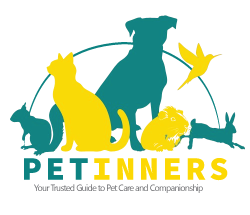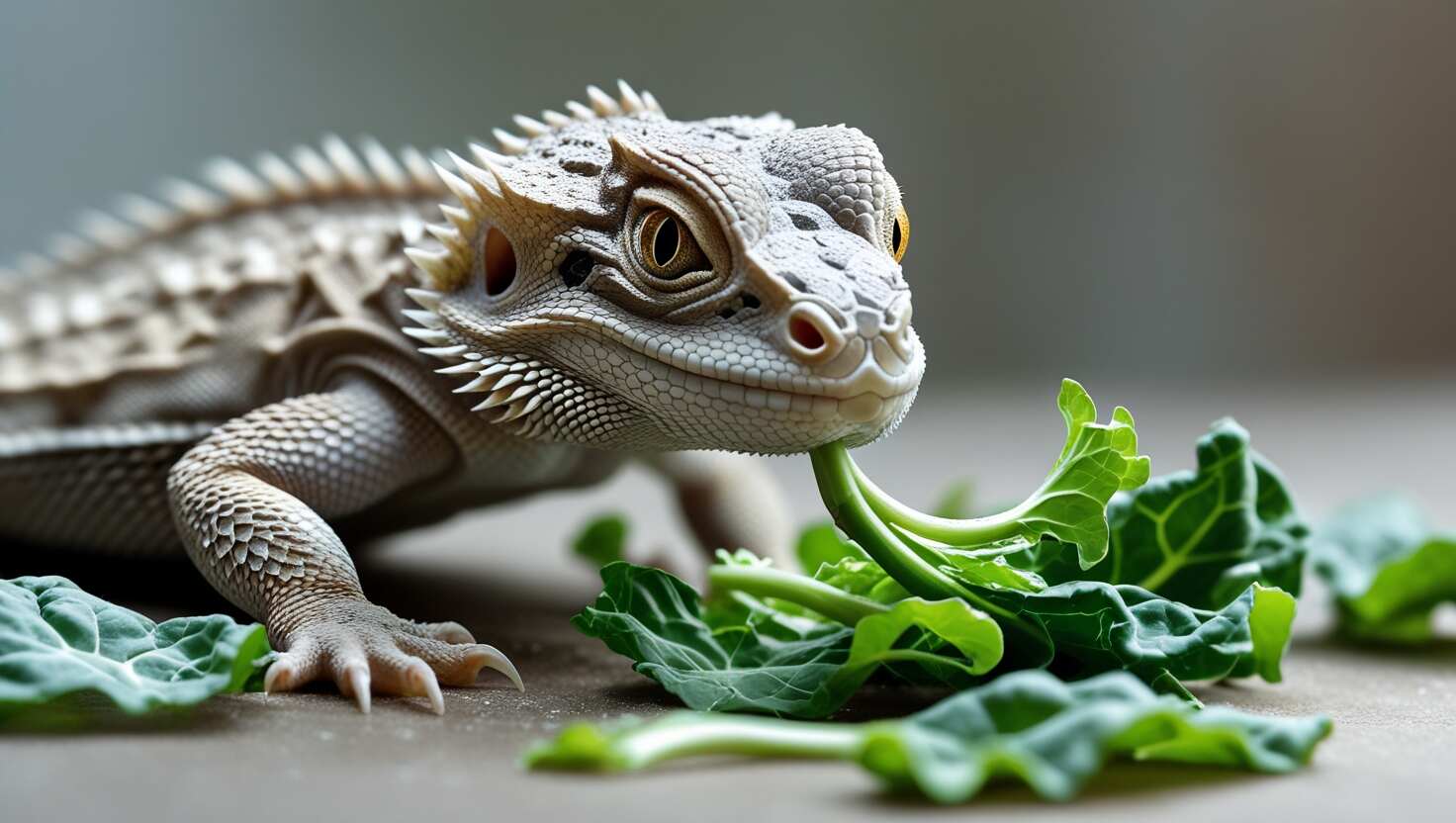Can Bearded Dragons Eat Collard Greens?
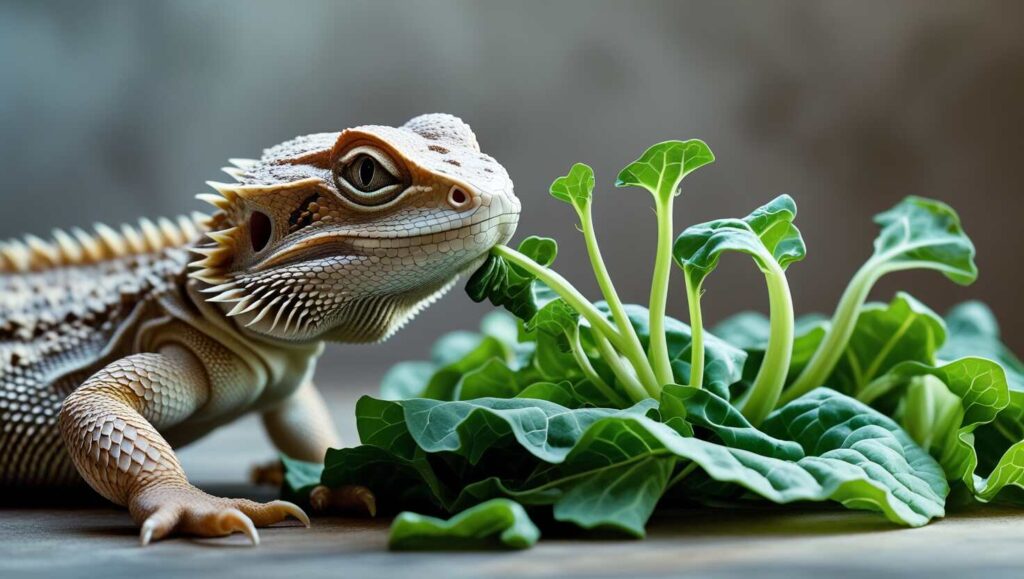
Yes, bearded dragons can safely eat collard greens. These greens are nutrient-rich, providing essential calcium, vitamins, and fiber to support healthy bones, digestion, and overall well-being. Serve them raw, washed, and finely chopped for best results.
Understanding Can Bearded Dragons Eat Collard Greens
Collard greens are a great addition to your bearded dragon’s diet. These exotic creatures need a balanced menu to stay healthy and happy. In the wild, their food choices include insects like Dubia roaches and crickets, along with various greens and plants. To mimic these natural conditions at home, it’s crucial to provide nutrient-dense options.
Collard greens are incredibly nutrient-rich, containing high levels of calcium and vitamins A and K. They’re low in sugar, fat, and oxalic acid, making them one of the healthiest veggies for your beardie. With a natural pH value and minimal oxalates, they help prevent calcium losses.
To enhance your dragon’s daily meals, try mixing collard greens with other veggies and live feeders. This will provide an extra boost to their nutrition while supporting their growth. Avoid overfeeding greens high in phosphorus without supplements to maintain a healthy balance.
An occasional update to your beardie‘s diet plan can improve their meals and meet their dietary qualifications. Providing a variety of foods helps your dragon thrive without depending on artificial sources.
Benefits of Collard Greens
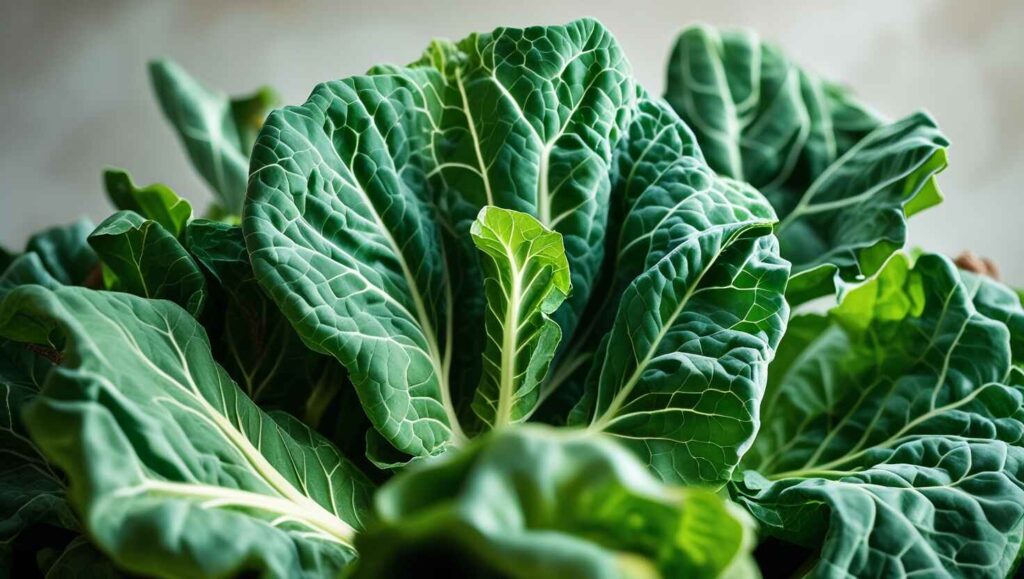
Collard greens are a highly nutritious addition to a bearded dragon’s diet. These greens provide essential nutrients to help keep your dragon healthy and active. Below are key benefits and reasons why collard greens should be part of your dragon’s meals.
Strong Bones and Muscle Health
Collard greens are rich in calcium, which is critical for maintaining healthy bones and strong muscles. The ideal calcium to phosphorus ratio of 14.5 supports efficient calcium absorption and helps prevent metabolic bone disease. This balance is crucial to avoid bone deterioration over time.
Boosts Immune System and Vision
These greens provide vitamins A, C, E, and K. Vitamin A improves your dragon’s eyes, while vitamin C strengthens their immune system and supports blood health. This mix of nutrients helps reduce oxidative stress and lowers the risk of diseases like cancer.
Supports Digestion and Liver Function
High fiber content aids digestion, preventing constipation. Collard greens also provide folate, which helps with cell growth and repair. Additionally, these greens promote proper liver and heart function, ensuring your dragon stays healthy in the long run.
Low Oxalates and Better Calcium Retention
Collard greens are low in oxalates, meaning they don’t bind calcium and interfere with its absorption. To maximize these benefits, you can sprinkle calcium powder on your dragon’s food. Combined with live feeders, these greens make a perfect addition to any reptile‘s diet.
Frequency and Variety
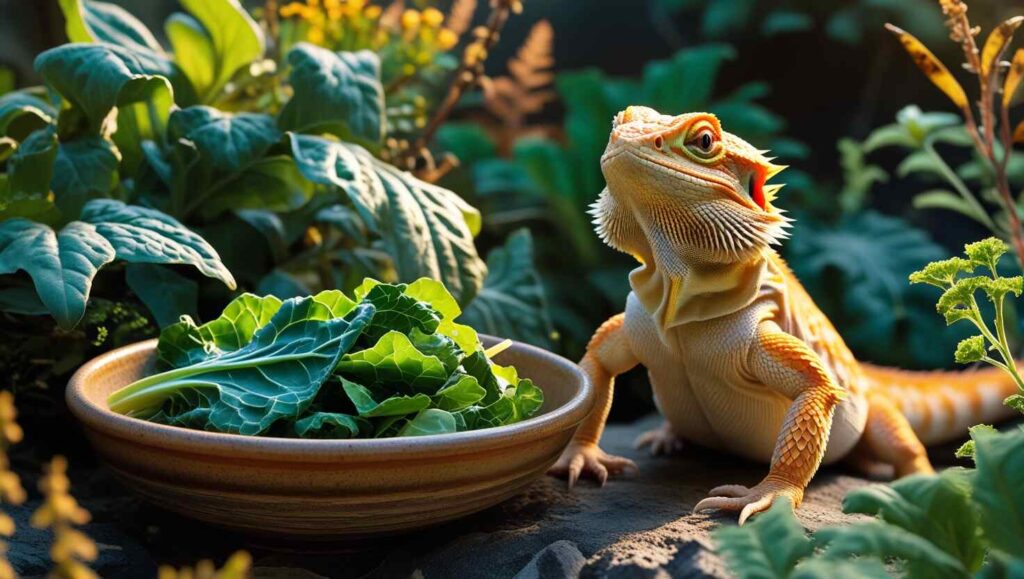
Collard greens are a great addition to a bearded dragon’s diet. However, to ensure proper nutrition, you need to understand how often and in what variety to offer these greens alongside other foods.
How Often Should Bearded Dragons Eat Collard Greens?
Bearded dragons can safely eat collard greens regularly. For babies, greens should be offered daily but balanced with dozens of live feeder insects to support their fast growing and developing needs. Adults require fewer live feeders and can have greens a few times per week.
Importance of Variety in Their Diet
While collard greens can be a staple, it’s important to alternate with other safe veggies. Options like prickly pear cactus pad, mustard greens, turnip greens, and endives prevent boredom and offer additional nutrients. This variety also keeps their appetite healthy and active.
Balancing Nutrients and Avoiding Harm
Adding nutrient-dense foods such as bell pepper, sweet potato, and dandelion greens improves their salad mix. Greens with low oxalates and phosphorus levels reduce the risk of harmful effects like calcium deficiency or metabolic bone disease.
How to Prepare and Serve Collard Greens
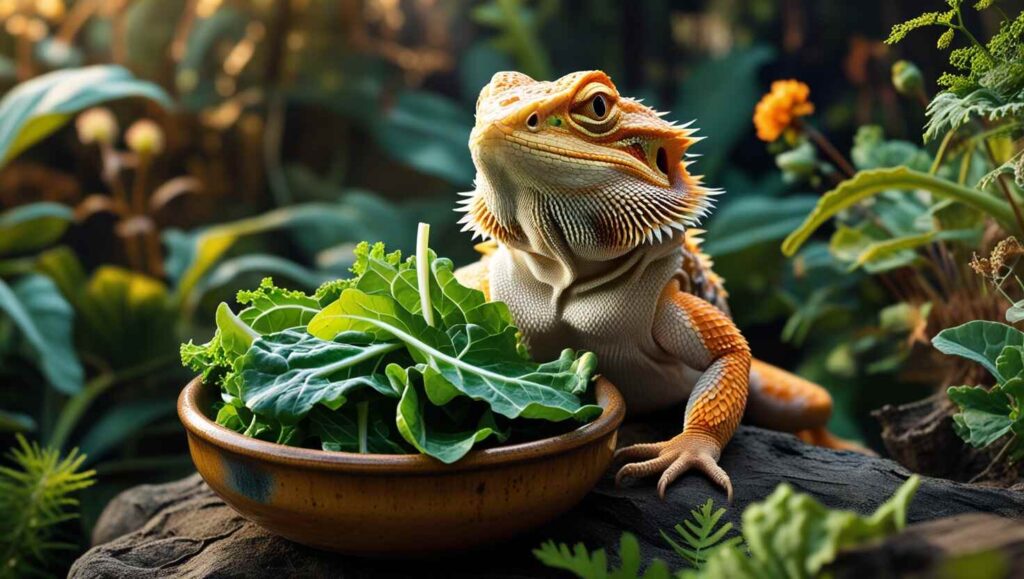
Collard greens are a great staple in a bearded dragon’s diet. It’s best to serve them raw, as cooking reduces important vitamins and minerals. Always choose fresh, organic produce that hasn’t been sprayed with harmful pesticides.
Rinse and Chop Properly
Before serving, rinse the greens thoroughly to remove dirt. Remove the tough stem, especially for younger beardies who may find it difficult to chew. You can shred or finely chop the leaves to make it easier for them to rip apart and eat.
Create a Balanced Salad
Mix collard greens with other leafy veggies like kale, which is safe when fed in moderation. For added flavor, include small chunks of apple, raspberries, or blueberries to add sweetness. This makes the salad more delicious and appealing to your dragon.
Avoid Cooking or Seasoning
Do not sauté the greens with oil, salt, or pepper, as these can harm your dragon. Keeping their food plain and fresh is the safest option.
Additional Notes
Collard greens are a cheap, nutritious vegetable that can be easily found at any supermarket or farm shop. They are rich in vitamins A and C, which are crucial for a healthy immune system and good vision.
These greens also provide decent calcium, helping prevent metabolic bone disease in your reptile. Always wash and chop them finely before feeding. Adding them to a salad mix with other spring greens ensures a balanced meal.
Conclusion
Collard greens are a valuable addition to your bearded dragon’s diet. They provide essential nutrients, including calcium, vitamins A and C, and fiber, which help maintain strong bones, a healthy immune system, and good digestion. However, it’s important to offer variety by combining these greens with other safe veggies and live feeders. This ensures balanced nutrition and prevents calcium loss due to excessive phosphorus or oxalates. Always wash and chop the greens before serving, and avoid using seasonings or cooking them. Regularly updating your dragon’s meal plan with nutrient-dense foods helps keep your pet healthy, happy, and thriving.
Kindly note: The content shared in this blog is gathered from online sources, some of which may not be verified. For accurate guidance on caring for your Bearded dragons, it is recommended to seek advice from a qualified veterinarian.
